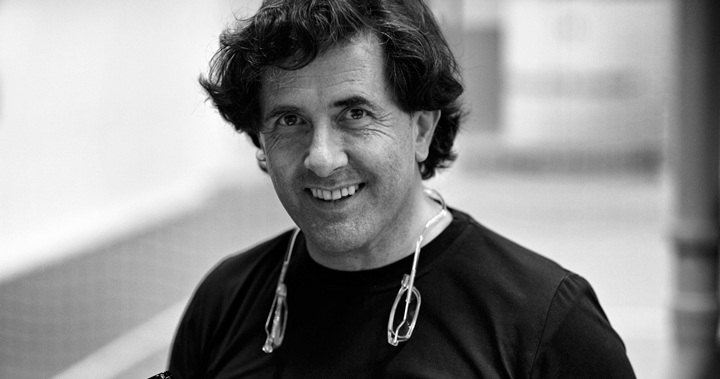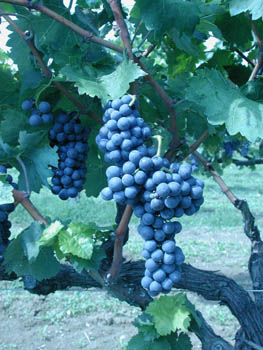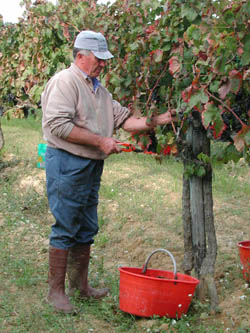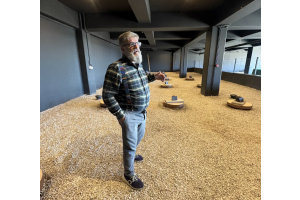
Giampiero Bea is the co-founder of ViniVeri and the winemaker at Paolo Bea Winery. ViniVeri is a natural wine fair that is held the Saturday before VinItaly, the major Italian wine tradeshow. VinItaly has been operating for 50 years -- it is large, noisy and offers much to complain about.
ViniVeri, on the other hand, is almost the polar opposite of VinItaly -- small and focused around a cohesive theme - natural wine.
Giampiero started ViniVeri in 2004 with a couple of like-minded winemakers to focus on promoting non-interventionist winemaking. They are self-described as a "group of anarchical naturalists." According to their manifesto, they were "tired of participating in wine fairs where the quality of a wine was judged more on the beauty of the stands surrounding it, than on the wine itself. Where packaging became more important than content." Today, the fair includes natural winemakers from all over the world including Spanish, French, German and even a group of committed Slovakian winemakers. It is comfortably crowded and one is able to engage in real conversation with the winemakers who seem genuinely excited to be talking about their wines with a sophisticated group of attendees. In all likelihood, if someone made the effort to attend ViniVeri, then he or she probably has enough knowledge to appreciate the wines being displayed.
ViniVeri is limited to winemakers who observe certain rules throughout the entire production cycle, both in the vineyard and the winery.
In the vineyard:
a) no herbicides and/or desiccant herbicides may be used; b) no chemical fertilizers may be used; c) genetically modified vines are prohibited; d) new vines planted in the vineyard must be sourced from pre-existing ones; e) the vineyard must cultivate indigenous grape varietials; f) disease may only be treated with products permitted by organic winegrowing standards, and, in no case are synthetic, local systemic or systemic products allowed; g) grapes must be harvested by hand.
In the cellar:
a) only native yeasts present on the grapes or in the cellar may be used in fermentation; b) no nutrients or other products may be added to modify the wine, such as vitamins, enzymes or bacteria; c) must concentration or forced-air drying methods are prohibited; d) the appassimento process of the grapes must occur naturally and not be forced; e) one may not manipulate the natural development of the must or wine by trying to speed up or slow down the process; f) temperature-controlled fermentation or prohibited; g) clarification or filtration of the wine is prohibited; h) sulfur dioxide levels may not exceed 80mg/l for dry wines and 100mg/l for sweet wines.
We talked with Giampiero Bea at ViniVeri about the importance of natural wine and the reasons behind the fair.
For a more detailed look at Paolo Bea Winery read Kristen Bieler's Grape Collective feature.
Christopher Barnes: Tell us about about the historical significance of the Paolo Bea estate.
Giampiero Bea: The history of the family. Well, my father, my family, has worked on our land for five centuries, for a long time. They worked just for oenology, not for investment. We transport in the glass five ceturies of tradition.

Tell us about Montefalco, the region where you make your wine and perhaps a little bit about Sagrantino.
In our region, the vines that are the most typical are the Sagrantino. For a long time, Sagrantino was produced in just sweet styles. In the last 35 years, there have been some experiments producing Sagrantino also in dry form, my family started this production in 1994. The first time Sagrantino dried for a long time. After many experiments our solution was to use long contact with the skin for about 35, 40, 49 days.
The grapes are very mature, long contact with the skin, with the seeds, and after when the skin goes down, when the wine comes up is an indication for a need to separate the skins. After, there are the long, long months, a year, about three, four years in all. A wait again after for ageing in the bottle.
Tell us what natural wine means to you. We are in a natural wine fair and everybody has a very strong belief in the way that they make wine. What does that mean to you?
Well, natural wine now is not just organic or biodynamic because in my opinion the organic or biodynamic process is on the land. Our goal is to arrive in the glass with the original grape, and use everything, skin, seed, juice. We don't add anything, don't separate anything, we assist with the process, but don't like to dominate it. Let it arrive in the glass with the original fruit without any additions.
You are one of the organizers of the ViniVeri. How did you decide to come up with this fair and what does the fair stand for?
I am the founder together with another three producers. In 2004, we founded the movement of ViniVeri in Italy. We were the first association to start in Italy. Now it is larger. Our objective is to organize the event to present, to expand the terminology of this idea, to produce not just organic or just biodynamic but in a natural method, natural all the way to the glass, the original fruit without any addition. Not easy to apply it sometimes.

This is because some wineries, just because they are organic or biodynamic, say that "I'm natural," but it's not true. For it to be natural the original fruit needs to remain in the glass. We like to organize this exhibition to expand the idea in this area and speak about this subject. We work for a funded European Federation because our work doesn't finish on the land, on the market but also because of the bureaucracy, because of the bureaucracy sometimes closes the door. We must be federated for our present situation.
Thank you, and the last question is: tell us about the terroir of Montefalco.
The terroir for the hill, the place where we work, where we have the vineyard is important. The first very important thing is to plant the vineyard where there is history.
The terroir is a combination from the wind, from the sand, from the seasons with our work - right to the glass. I don't like to dominate it, the environment, the process but to arrive to the glass with just my assistance without any domination.














